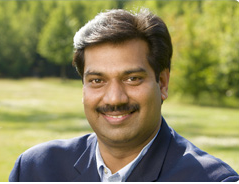14 April 2014
 Amitabh Srivastava, the South Asia regional head of the Association for International Broadcasting (AIB), has been announced as one of the judges at the IRF annual awards, bringing his 20 years of broadcasting and related industry experience to judging the best in Indian radio.
Amitabh Srivastava, the South Asia regional head of the Association for International Broadcasting (AIB), has been announced as one of the judges at the IRF annual awards, bringing his 20 years of broadcasting and related industry experience to judging the best in Indian radio.
 The annual India Radio Forum is dedicated to advancing the role and increasing the effectiveness of promotion and marketing within the radio and media industry, related industries and the academic community. It gathers together key radio and media players to discuss radio of today and of the future. IRF presents strategic options, latest development and networking opportunities for all industry players and it attracts senior executives from within the industry and outside.
The annual India Radio Forum is dedicated to advancing the role and increasing the effectiveness of promotion and marketing within the radio and media industry, related industries and the academic community. It gathers together key radio and media players to discuss radio of today and of the future. IRF presents strategic options, latest development and networking opportunities for all industry players and it attracts senior executives from within the industry and outside.
The aims are furthered through the annual Awards show, bringing together the best of talent, marketing & promotion and creative excellence in the Radio and Media industry in India every year.
The 2014 forum and awards ceremony is being held on the 30 May at The Habitat Centre, New Delhi with the theme: INSPIRE * CONNECT*SHARE
16 October 2013
FRANCE 24 has concluded a new distribution agreement in India and will be available on free-to-air Direct-To-Home service (DTH) DD DIRECT +. Owned by public broadcaster Prasar Bharati, the platform will begin broadcasting FRANCE 24 English version on November 1st.
Thanks to this agreement, FRANCE 24 will also be available on DISH TV basic offer, the n°1 private satellite operator in the country.
Thanks to this new agreement, which represents the most important deployment for the channel on the Asian market, FRANCE 24 will now be available 24/7 to 31 million additional households across the country. These will be in addition to the 7 million households that already receive the channel via cable.
One in every four Indian televised households can now access FRANCE 24 and a special operation will take place in New Delhi in November to mark this major agreement.
For more real time information on FRANCE 24’s distribution worldwide, go to: http://f24.my/ijOOim
8 June 2010
The YouTube video which is embedded below is a presentation by Dr Anthony Leiserowitz of Yale University of the results of the lastest Gallup survey of attitudes of people throughout the world to climate change. The survey has been carried out annually since 2006 and has a huge scope with nearly half a million people having been polled up to now. Although Dr Leiserowitz obviously believes in manmade climate change and the need to act to combat it, the figures provide interesting reading whatever your views.
The headline states that 40% of the world have not heard of climate change, but in fact the 40% figure includes those who answered “Do Not Know” and those who refused to answer the question, as well as those who actually said they had not heard of climate change. It also, as Dr Leiserowitz carefully points out, does not mean that 40% have not experienced changes in climate themselves. However, this headline figure is a good indication of how many people, usually the most disadvantaged by poverty and lack of education, are not aware of the debate and so have very little voice in deciding how the issue should be tackled.
http://www.youtube-nocookie.com/v/B3R6VE4EvnU&hl=en_GB&fs=1&rel=0
The analysis by country is fascinating and makes the video well worth watching. The results of the first question, on awareness, are not that surprising, with the developed world most aware of the debate and Africa & South Asia the areas least aware. Some countries have over 70% of their population unaware and because of their large populations India & China have by far the largest number of inhabitants who are unaware. The example of Bangladesh is used to analyse the huge gap in awareness between those who are highly educated (98% aware) and those who are mainly or totally uneducated (under 30%).
But the question of belief in the causes of climate change presents a different geographical picture, with the USA joining India and a number of African countries as those with the highest belief that climate change is due to natural causes. Also, it is the countries of South America, particularly Brazil, who feel the risk to them from climate change is the highest.
Finally, despite the differing views, it is interesting to note that in nearly all the countries which are major carbon emitters, there is a majority of those who are aware who state that their governments should be doing more.
For more details of this report and similar work, visit the Yale Project Climate Change Communication website
7 May 2010
The new People’s Choice award in this year’s AIBs is very exciting for a number of reasons. It is the first time we are asking the general public to vote for awards, which allows the shortlisted entrants to gain a wider exposure for their programmes, as viewers will come from throughout the world, including many countries where the programmes are not currently broadcast. The voting process will also use social media to gain interest and attention, providing another example of the sort of audience engagement and participation which is becoming more and more important to broadcasting in the 21st century.
In addition climate change, the subject of programmes in the People’s Choice award, is a highly topical subject which provokes fierce debate and raises issues which could have a dramatic impact on the way that all nations live. Different countries, and even different tribes and regions within countries, risk being affected in different ways. For example, the indigenous people of the Amazon risk their lands turning into dry savanna (see here for how our sponsor, ADB, is helping the Surui tribe) while the coastal regions risk more flooding.
Because of the differing risks, as well as different political viewpoints, the range of views on climate change is enormous and the challenges of exploring and explaining the science are great. We hear about the fierce debates in the US Senate ; India and China are signing up to the Copenhagen accord; a survey in Africa shows that many Africans blame God and not global emissions for climate change; countries as diverse as Mongolia, Saudi Arabia and Madagascar show increasing awareness by joining in Earth Day celebrations.
We are eager to see the submissions for the People’s Choice award to see how broadcasters from throughout the world are tackling this contraversial issue which raises such passion and which is so important to all of our futures.
 Amitabh Srivastava, the South Asia regional head of the Association for International Broadcasting (AIB), has been announced as one of the judges at the IRF annual awards, bringing his 20 years of broadcasting and related industry experience to judging the best in Indian radio.
Amitabh Srivastava, the South Asia regional head of the Association for International Broadcasting (AIB), has been announced as one of the judges at the IRF annual awards, bringing his 20 years of broadcasting and related industry experience to judging the best in Indian radio. The annual India Radio Forum is dedicated to advancing the role and increasing the effectiveness of promotion and marketing within the radio and media industry, related industries and the academic community. It gathers together key radio and media players to discuss radio of today and of the future. IRF presents strategic options, latest development and networking opportunities for all industry players and it attracts senior executives from within the industry and outside.
The annual India Radio Forum is dedicated to advancing the role and increasing the effectiveness of promotion and marketing within the radio and media industry, related industries and the academic community. It gathers together key radio and media players to discuss radio of today and of the future. IRF presents strategic options, latest development and networking opportunities for all industry players and it attracts senior executives from within the industry and outside.